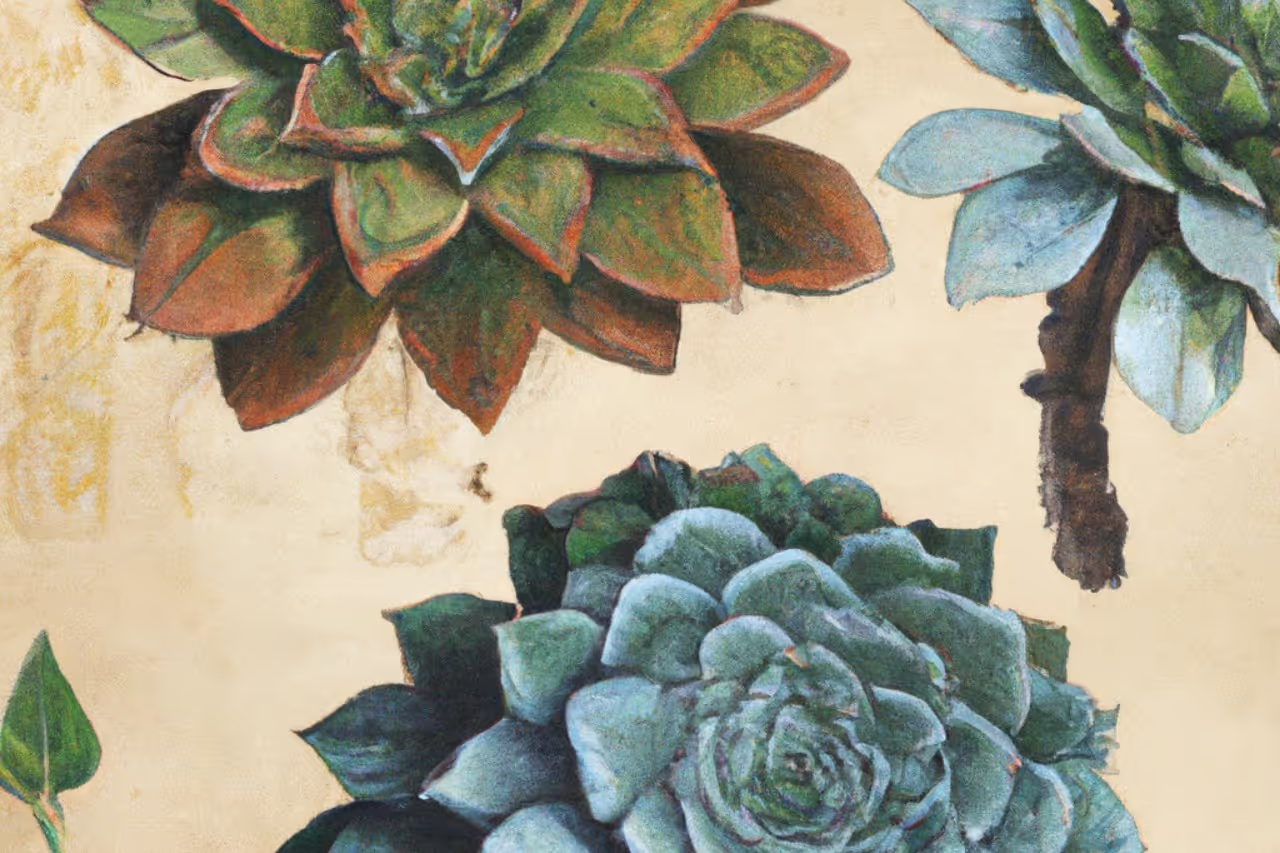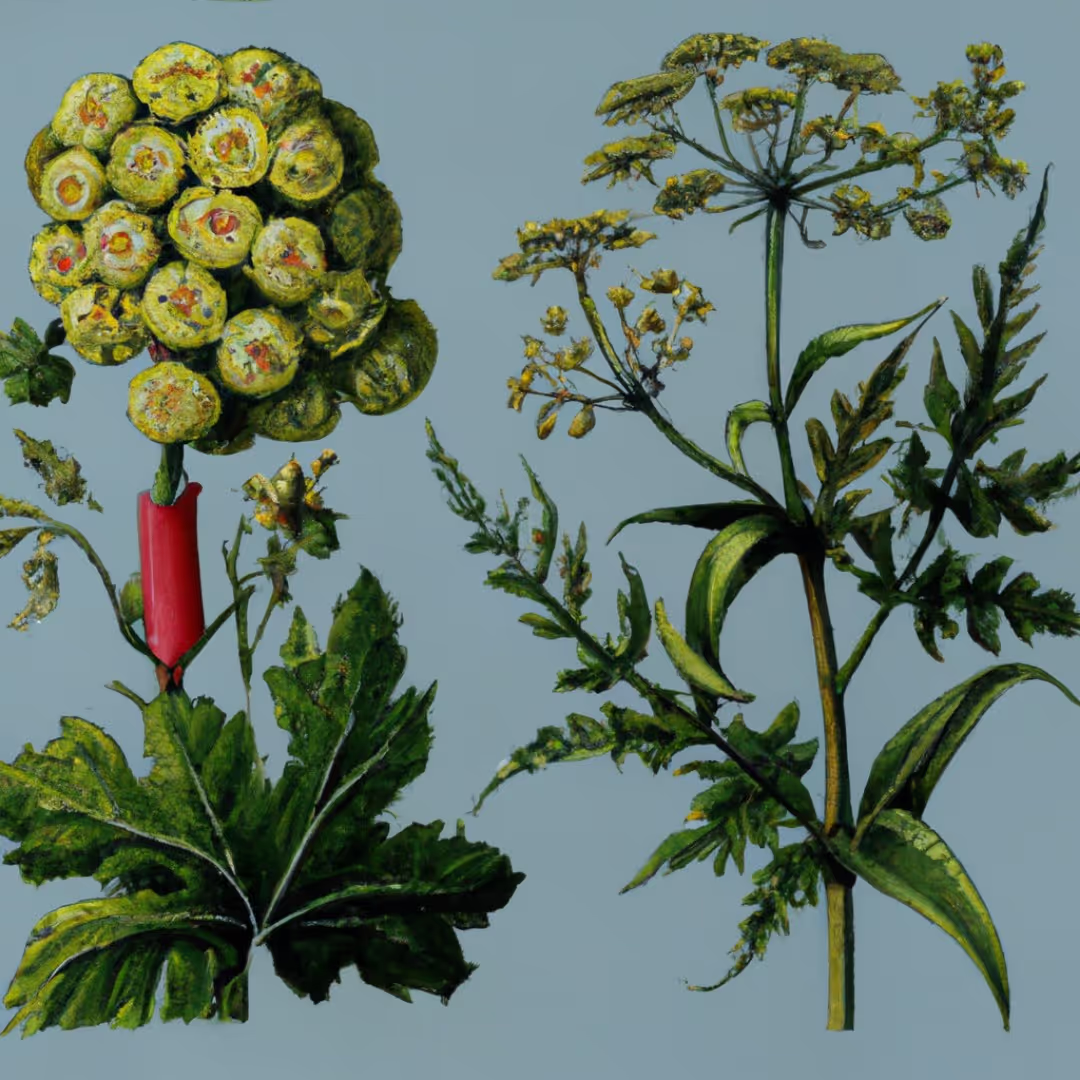How to Grow Succulents

Succulents
Succulents need 6-8 hours of bright light, gritty fast-draining soil, and pots with drainage. Succulents prefer deep, infrequent watering; soak-and-dry: water thoroughly, then let soil dry fully. Succulents root best in a 50:50 cactus mix with perlite or pumice; feed at half-strength in spring. Treat them like desert fare—sun, stone, a measured pour—and they’ll reward you with sculptural calm.
Cheatsheet: Succulent Mastery for Containers & Gardens
🌞 Best Light
6+ hrs direct sunlight daily. Rotate pots for even sun. Indoors: use a bright south-facing window or full-spectrum grow light.
🪴 Soil Matters
- Use well-draining cactus/succulent mix
- Add perlite, pumice, or sand (30%) for drainage
💧 Watering Wisely
- Water only when soil’s dry (every 10–21 days)
- Soak, then drain completely; never let roots sit in water
- Winter: cut water by half
🌡️ Temperature & Humidity
- Ideal: 65–80°F (18–27°C)
- Protect from frost (<40°F / 4°C)
- Low humidity best; avoid steamy bathrooms
🧰 Tools & Products You'll Need
- Gloves
- Terra cotta or plastic pots (drainage holes)
- Cactus soil mix & perlite/pumice
- Small trowel
- Watering bottle/can with narrow spout
- Fertilizer (diluted, spring/summer only)
- Soft brush for cleaning leaves
🌱 Easy Steps to Success
- Prepare pot: Add mesh or gravel over drainage holes
- Fill & plant: Add soil mix; plant at same depth as nursery pot
- First watering: Wait 1–2 days after planting, then water thoroughly
- Placement: Move to bright, sunny location
- Maintenance: Remove dead leaves, inspect for pests monthly
🌿 Health, Nutrition & Self-Sufficiency
Succulents boost indoor air quality. Edible types (e.g., Aloe vera, Purslane) offer vitamins & antioxidants.
📈 Fast Fact
Succulents use 90% less water than most houseplants.
Light drives everything
I grow Succulents like I roast coffee, by reading the light. Plants stay compact and colorful near 25,000 to 50,000 lux indoors or roughly 2,300 to 4,600 foot candles, while outdoor summer sun can blow past 90,000 lux at noon.
If rosettes stretch like taffy, that is etiolation. I move them closer to a south or west window, then acclimate outdoors in spring to avoid scorch.
Grow lights that actually work
LEDs with 4000 to 6500 K and a Photosynthetic Photon Flux Density of 150 to 300 µmol m−2 s−1 keep leaves tight and hues vivid. I aim for a Daily Light Integral around 10 to 20 mol m−2 d−1 for maintenance, then 20 to 30 for color on sun-hungry genera like Echeveria and Graptopetalum.
Raise the fixture if leaf tips bronze, or shorten the timer from 14 hours to 10. Add airflow and heat stays sane.
Strong light produces compact growth, muted light produces stretch.
Water with intention, let physics help
Most species use CAM photosynthesis, which means stomata open at night to trade gases while saving water. So I water deeply, then wait for the mix to dry almost completely before a refill.
In active growth I soak until 10 to 20 percent drains, then I ignore the plant until leaves just begin to feel flexible. In winter I water half as often and before a cold snap I keep roots on the dry side.
CAM occurs across multiple plant families and helps plants limit daytime water loss.
Soil that breathes
I stopped using peat-heavy potting soil for Succulents. A fast-draining gritty mix keeps roots oxygenated and rot at bay.
- My indoor mix: 1 part 3 to 6 mm pumice, 1 part coarse horticultural sand, 1 part pine bark fines, with 10 percent high quality potting mix for cation exchange.
- pH sweet spot sits near 5.8 to 6.5, and I keep electrical conductivity near 0.8 to 1.2 dS m−1 for container culture.
Top dress with 3 to 5 mm gravel or chicken grit to keep crowns dry and algae off the surface. It also makes watering more even by diffusing flow.
Pots change the game
Terracotta pulls moisture, plastic holds it, glazed ceramic sits in the middle. I match pot to climate and watering style.
- Small rosettes in terracotta in humid rooms.
- Thirstier Kalanchoe and Crassula in glazed clay in dry homes.
- Shallow wide pots for clustering offsets, narrow deep pots for taprooted Pachypodium and Adenium.
Fertilizer, minimal but consistent
I feed during growth with quarter-strength balanced fertilizer at roughly a 3-1-2 ratio, two times per month. Add calcium and magnesium if your water is very soft, or leaf tips may crisp.
Slow-release prills work for outdoor bowls, yet indoors I prefer dilute liquid feeds so I can throttle back quickly. Salt crust on the rim means I flush the pot with plain water.
Temperature and seasonal rhythm
Most Succulents enjoy 60 to 85 F, which is 16 to 29 C. I keep nights 50 to 60 F in fall, or 10 to 16 C, to bring out reds and purples in rosettes.
- Winter growers: Aeonium, some Haworthia, and many Aloes wake up in cool bright weather.
- Summer growers: Echeveria, Graptoveria, and Sedum push hardest in warm months.
- Hardies: Sempervivum and many Sedum shrug at 10 F or minus 12 C once established in the ground.
Propagation that sticks
Leaf props work on Echeveria and Graptopetalum, yet fail on Aloe and Aeonium. I twist leaves cleanly, let the wound callus 3 to 7 days, then set on dry mix until roots appear.
For stems, I take 2 to 4 inch cuttings, cure a week, then plant shallow. A humidity dome stays off, but I mist the substrate edges so roots chase moisture.
Pests and problems
Mealybugs hide in leaf axils like lint with teeth. I hit them with 70 percent isopropyl on a cotton swab, then follow with a light horticultural oil a week later.
Fungus gnats signal wet soil. I dry the pot, add more mineral grit to the top inch, and use a biological control like Bt israelensis if larvae persist.
- Soft rot smells sweet and spreads fast, so I cut above the mush and reroot the healthy top.
- Sun scorch looks like white papery patches, which never green up again, so I acclimate slowly next time.
Design moves that pay off
Color comes from stress, so I combine full sun Echeveria with calmer, shade-tolerant Haworthia to build contrast that lasts. In bowls I layer heights with shrubby Crassula in back, rosettes mid, and trailers like Senecio rowleyanus spilling forward.
Lava rock chips in the mix raise airflow in big pots. For outdoor rock gardens, I tilt plants slightly so water never pools in the crown.
Counterintuitive truth about terrariums
Sealed glass and Succulents do not get along with nightly CO2 exchange and high humidity. If you insist, use a wide open vessel with a fan nearby and grit-heavy media.
Best picks by setting
- Low light rooms: Haworthia cooperi, Gasteria bicolor, Sansevieria trifasciata.
- Bright windows: Echeveria agavoides, Graptopetalum paraguayense, Crassula perforata.
- Hanging: Senecio rowleyanus, Sedum morganianum, Othonna capensis.
- Office under LEDs: Pachyphytum oviferum, Aloe juvenna, Peperomia graveolens.
- Hardy outdoors: Sempervivum tectorum, Sedum spurium, Delosperma cooperi.
- Pet cautious households: Haworthia and Gasteria tend to be safer, while Euphorbia, Kalanchoe, and Crassula ovata can be toxic to pets.
Buying guide and gear checklist
I pick plants with firm leaves, no corking at the base, and symmetrical growth with short internodes. Pale, stretched necks in Echeveria mean weak light at the nursery.
- Soil components to stock: pumice, coarse sand, pine bark fines, and poultry grit.
- Pots: terracotta for humid homes, glazed ceramic for arid interiors, always with a drainage hole.
- Lights: full spectrum LED bars or panels with dimmers, set on a timer.
- Meters that help: a simple lux app for relative light, a moisture probe you ignore once you learn the dry weight of the pot.
If ordering online, I prefer bare root shipping in paper. I pot immediately into my own mix and withhold water for 5 to 7 days so broken roots seal.
Quick troubleshooting
- Puckered leaves and light pot weight: water thoroughly, then wait.
- Mushy leaves and heavy pot: unpot, cut away rot, repot into gritty mix, no water for a week.
- Long neck and pale color: increase light and turn the pot weekly.
- Brown leaf tips with white crust on soil: flush with plain water and reduce fertilizer strength.
Anecdotes from the bench
My toughest plant is a battered Graptopetalum rescued from a sidewalk crack that now fills a 12 inch bowl. It taught me the rhythm of drench and drought better than any book.
I color up Echeveria agavoides by moving it outdoors in spring, then letting nights drop to 50 F or 10 C, and the red margin snaps into focus like film in a darkroom tray.
Stats and takeaways to remember
Full summer sun can top 90,000 to 100,000 lux, while a bright window might sit near 10,000 to 20,000 lux at midday.
Many container Succulents thrive with a DLI of 10 to 20 mol m−2 d−1 indoors and 20 to 30 outside during peak color.
Most rot starts from chronic wetness, not one heavy watering, so fast-draining media is a lifesaver.
Sources I trust for Succulents
- Royal Horticultural Society, cultivation pages on cacti and succulents and watering guidance.
- Desert Botanical Garden, cultural notes on light and heat for arid species.
- Kew Science, clear explanations of CAM physiology across plant families.
- University of California Master Gardeners and Cooperative Extension, container media and irrigation best practices.
- Missouri Botanical Garden Plant Finder, species profiles with growth and hardiness details.
Frequently Asked Questions About Growing Succulents
How often should succulents be watered?
Water succulents sparingly, allowing the soil to dry completely between sessions. On average, watering every 10–14 days during warm periods is sufficient, but less frequently during colder months. Overwatering may cause roots to rot, so monitoring moisture levels regularly will sustain optimal plant health.
Which type of soil suits succulents best?
Succulents thrive in a porous, well-draining soil mix. Combine standard potting soil with additional coarse materials, such as sand or perlite, to enhance drainage. This mixture reduces moisture retention, helping roots breathe and preventing fungal issues.
Where should I position succulents for optimal growth?
Place succulents where they receive at least 4–6 hours of indirect, bright sunlight daily. Indoor south- or east-facing windowsills offer ideal conditions. If grown outdoors, select a spot partially shaded from harsh midday sun to avoid sunburned foliage.
What signs indicate my succulent is unhealthy?
Watch for key indicators such as leaves that become mushy or wrinkled, color changes to yellow or brown, stretched-out growth, or minimal new development. Such signals typically indicate issues related to overwatering, insufficient sunlight, or inadequate drainage.
How can succulents be propagated successfully?
Propagation occurs easily from leaf or stem cuttings. Allow selected cuttings to form a calloused end for 3–4 days. Plant into dry, well-draining soil and postpone watering until new roots or growth appear. Patience results in healthy, vibrant offspring from your mature succulents.
What temperature conditions are optimal for succulents?
Most succulents favor daytime temperatures between 60–80°F (16–27°C) and can tolerate nighttime drops as low as 45°F (7°C). Keep them from extended exposure to freezing temperatures or prolonged heat above 90°F (32°C) to maintain vigor and vibrancy.
Succulents reward simple, steady care. Give them bright light, fast-draining soil, and water that soaks the pot then dries out fully. Airflow helps. Containers need real drainage; terracotta keeps roots honest. Rotate pots, ease plants into stronger sun to avoid scorch, shelter from frost and long rain.
Build a gritty mix with plenty of mineral grit or pumice. Feed lightly in spring with diluted, low-nitrogen fertilizer; stop feeding as days cool. Watch for mealybugs; isolate and treat fast. Propagate from leaves and cuttings after a dry callus forms, then plant shallow and wait. Repot when soil slumps or roots circle. Healthy succulents have firm leaves, tight centers, and color that deepens with sun. Keep your setup simple, pay attention, and let the plants tell you what they want.







